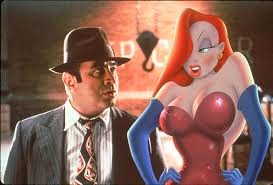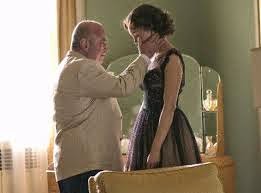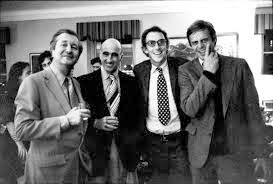 Bob Hoskins was one of
the key crime actors of the past forty years, and though he was a
better and far more nuanced actor than his posthumous typecasting as
a cockney or gangster might suggest, he was integral to a number of
films which helped open up and redefine the crime genre. I would see
Hoskins around occasionally, especially in Soho, often unkempt and
dishevelled-looking, and always radiating an intensity which I think
reflected in a very intelligent way through his films. He used that
sense of intensity to suggest violence and dare you to miss what was
happening underneath.
Bob Hoskins was one of
the key crime actors of the past forty years, and though he was a
better and far more nuanced actor than his posthumous typecasting as
a cockney or gangster might suggest, he was integral to a number of
films which helped open up and redefine the crime genre. I would see
Hoskins around occasionally, especially in Soho, often unkempt and
dishevelled-looking, and always radiating an intensity which I think
reflected in a very intelligent way through his films. He used that
sense of intensity to suggest violence and dare you to miss what was
happening underneath.
Starting with The Long Good Friday, which came out of nowhere (well, the
Edinburgh Festival) to captivate me and rest of the London Film Festival and then go on
to huge success.  The film remains eerily prescient about Thatcherism
and the 'New Britain' it spawned, and Hoskins' Harold Shand is
absolutely perfect in his greedy arrogance. It remains perhaps the
best British noir. And what's interesting too is the way Shand was
the dark side of his Arthur Barker from Dennis Potter's Pennies From
Heaven, who was actually dark enough underneath, which was partly why
his Arthur is better than Steve Martin's, the other part being
Hoskins' reluctance to play as much for sympathy.
The film remains eerily prescient about Thatcherism
and the 'New Britain' it spawned, and Hoskins' Harold Shand is
absolutely perfect in his greedy arrogance. It remains perhaps the
best British noir. And what's interesting too is the way Shand was
the dark side of his Arthur Barker from Dennis Potter's Pennies From
Heaven, who was actually dark enough underneath, which was partly why
his Arthur is better than Steve Martin's, the other part being
Hoskins' reluctance to play as much for sympathy.
 The film remains eerily prescient about Thatcherism
and the 'New Britain' it spawned, and Hoskins' Harold Shand is
absolutely perfect in his greedy arrogance. It remains perhaps the
best British noir. And what's interesting too is the way Shand was
the dark side of his Arthur Barker from Dennis Potter's Pennies From
Heaven, who was actually dark enough underneath, which was partly why
his Arthur is better than Steve Martin's, the other part being
Hoskins' reluctance to play as much for sympathy.
The film remains eerily prescient about Thatcherism
and the 'New Britain' it spawned, and Hoskins' Harold Shand is
absolutely perfect in his greedy arrogance. It remains perhaps the
best British noir. And what's interesting too is the way Shand was
the dark side of his Arthur Barker from Dennis Potter's Pennies From
Heaven, who was actually dark enough underneath, which was partly why
his Arthur is better than Steve Martin's, the other part being
Hoskins' reluctance to play as much for sympathy.
He was a fine Owney
Madden in Cotton Club, before playing George in Neil Jordan's Mona
Lisa (itself a sort of companion piece to The Crying Game) and in a non-crime context, opposite Maggie Smith in The Lonely
Passion Of Judith Hearne. I mention the latter, which I think is one of his great roles, because his character
in the film plays on the qualities he brought out in Pennies From
Heaven and in Mona Lisa, a combination of need and very mundane
hubris that he is never afraid to show.
 Then of course came his
signature role, as Eddie Valiant in Who Framed Roger Rabbit. If The Long Good
Friday was prescient about Thatcherism, Roger Rabbit is, underneath
the animation, like a sequel to Chinatown, or Chinatown crossed with
Pennies From Heaven. It never stretches the audience's suspension of
disbelief, at least not until the finale, and it plays with the
conventions of the detective movie (and of cartoons) with far more
conviction and far better than say Bugsy Malone.
Then of course came his
signature role, as Eddie Valiant in Who Framed Roger Rabbit. If The Long Good
Friday was prescient about Thatcherism, Roger Rabbit is, underneath
the animation, like a sequel to Chinatown, or Chinatown crossed with
Pennies From Heaven. It never stretches the audience's suspension of
disbelief, at least not until the finale, and it plays with the
conventions of the detective movie (and of cartoons) with far more
conviction and far better than say Bugsy Malone.
Hoskins had a sideline
playing historic figures. In crime terms, his J. Edgar Hoover in
Oliver Stone's Nixon is as telling a stroke of supporting casting as
Anthony Hopkins' was of casting a lead. I doubt anyone else will ever
play both Hoover and Laurent Beria, which Hoskins did in
Konchalovsky's The Inner Circle. Or, on a less notable level, could
anyone else play both Pope John 23 and Mussolini? Hoskins did, though
not in the same movie. Or both Churchill and Manuel Noriega?
He was an out and out
villain, but with a cuddly exterior and at least some sense of guilt Felicia's Journey, opposite Elaine Cassidy, whose intensity makes his performance all
the
more disturbing. He was Verloc in
Christopher Hampton's strangely listless version of The Secret Agent,
 but he was at his hardboiled best in Hollywoodland, in which Adiren
Brody plays a detective investigating the suicide of George Reeves,
the actor who played Superman on TV. The film falls just short of
excellent, partly by Brody's overly louche interpretation, but
playing Hollywood fixer Eddie Mannix Hoskins is again superb, playing
for contrast against Diane Lane, his wife, who is having an affair
with Reeves, which may be why Reeves' suicide wasn't suicide at all.
Lane deserved a Supporting Actress Oscar, and Ben Affleck, as Reeves,
gave what may be his best performance; Hoskins plays off both of them
brilliantly.
but he was at his hardboiled best in Hollywoodland, in which Adiren
Brody plays a detective investigating the suicide of George Reeves,
the actor who played Superman on TV. The film falls just short of
excellent, partly by Brody's overly louche interpretation, but
playing Hollywood fixer Eddie Mannix Hoskins is again superb, playing
for contrast against Diane Lane, his wife, who is having an affair
with Reeves, which may be why Reeves' suicide wasn't suicide at all.
Lane deserved a Supporting Actress Oscar, and Ben Affleck, as Reeves,
gave what may be his best performance; Hoskins plays off both of them
brilliantly.
 but he was at his hardboiled best in Hollywoodland, in which Adiren
Brody plays a detective investigating the suicide of George Reeves,
the actor who played Superman on TV. The film falls just short of
excellent, partly by Brody's overly louche interpretation, but
playing Hollywood fixer Eddie Mannix Hoskins is again superb, playing
for contrast against Diane Lane, his wife, who is having an affair
with Reeves, which may be why Reeves' suicide wasn't suicide at all.
Lane deserved a Supporting Actress Oscar, and Ben Affleck, as Reeves,
gave what may be his best performance; Hoskins plays off both of them
brilliantly.
but he was at his hardboiled best in Hollywoodland, in which Adiren
Brody plays a detective investigating the suicide of George Reeves,
the actor who played Superman on TV. The film falls just short of
excellent, partly by Brody's overly louche interpretation, but
playing Hollywood fixer Eddie Mannix Hoskins is again superb, playing
for contrast against Diane Lane, his wife, who is having an affair
with Reeves, which may be why Reeves' suicide wasn't suicide at all.
Lane deserved a Supporting Actress Oscar, and Ben Affleck, as Reeves,
gave what may be his best performance; Hoskins plays off both of them
brilliantly. I would have most liked to see do Beckett.
I would have most liked to see do Beckett.
But it is for crime movies that
Hoskins' is likely to be remembered, for George in the star-shaped
sunglasses, for Eddie Valiant with the toons, for Harold Shand
looking back from the rear of a taxi, his dreams of a rich new world
disappearing into the old violence. He was a great actor, and leaves
a great legacy, even beyond those crime classics.
NOTE: This essay will also appear at Crime Time (www.crimetime.co.uk)
NOTE: This essay will also appear at Crime Time (www.crimetime.co.uk)





















